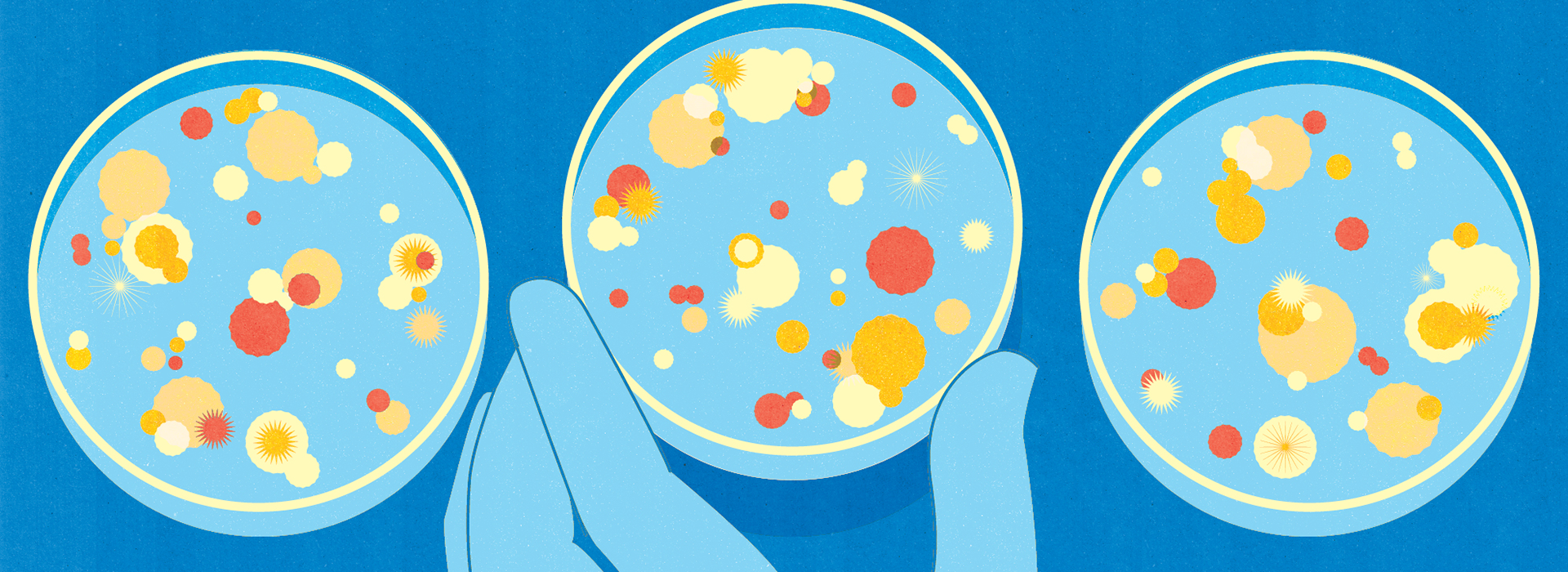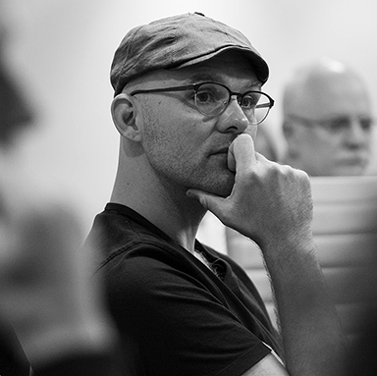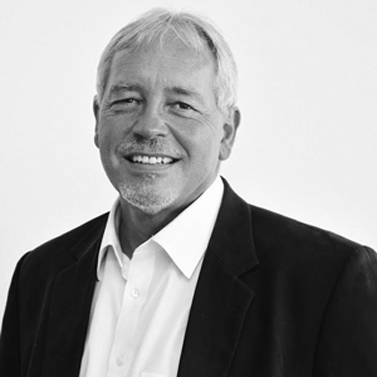By: Reach
19 Jul, 2018

New understanding of the human microbiome — the billions of microbes that live in and around us — have given unexpected insights into human health, development, and evolution.
But CIFAR Fellows Tobias Rees (University of California, Berkeley) and Thomas Bosch (Kiel University) think the implications go further than that, to the fundamental question of what it means to be a human being. Rees, an anthropologist, and Bosch, an evolutionary developmental biologist, met through the CIFAR Humans & the Microbiome program. With colleague Angela E. Douglas, they published a paper in PLOS Biology called “How the Microbiome Challenges the Concept of Self.” Reach talked with the two about their work. The interview is edited for length and clarity.

Tobias Rees
Reach: What got you thinking about these ideas in the first place?
Tobias Rees: Thomas and I met in 2015, at the first meeting of the Humans & the Microbiome program. The first talk was by Thomas.He asked whether the immune system really is, as had classically been assumed, a self/not-self recognition system. You know, the idea that the immune system is basically a defence system that can tell self apart from not-self or microbe, killing the latter.
His suggestion was to drop the self/notself idea and to instead rethink the immune system in terms of a meta-organism — that is, from the perspective of a fully integrated system between the human body and our microbial cells. If looked at from the perspective of a meta-organism, Thomas suggested, notself or bacteria are part of self and hence the idea of the immune system as a self/not-self recognition system whose main job is defence falls apart. Could it perhaps be that the major job of the immune system is less defence than a selection of the microbes the meta-organism needs to flourish?
His talk triggered a wild discussion amongst all the members, and Thomas and I were both vigorously defending the idea that we are multi-organismal, and in the heat of this discussion a beautiful friendship was born.

Thomas Bosch
Thomas Bosch: We immediately realized that we’re a perfect complement of each other because I was in a natural sciences community, but realized that we need advice and explanations from outside the natural sciences, and particularly anthropology, and Tobias provided this.
Reach: What was the new science that led to these new ideas?
Bosch: The paradigm shift was with this new insight that both the innate immune system and the adaptive immune system are based in part on microbial input. That means microbes are an essential part of our immune system, meaning that non-self is part of what was previously believed to be self. The immune system has been considered one of the three pillars of the definition of self. The others are the brain and the genome. We know that the brain certainly is heavily affected by the microbial community, and the same is of course true of the genome. We can trace about 37 per cent of the human genome to a bacterial origin.
So facts that were believed 20 or 30 years ago to be the definition of an individual self — the immune system, your brain and also your genome — are is getting very blurry and have to be rethought. That’s the point of this paper.
Rees: Let me follow up on this and use you as a guinea pig, if you don’t mind: imagine that we actually don’t know where you end and your microbiome begins, as if there were an overlap.
Reach: Mm-hmm.
Rees: If this is true then that means that there is an indistinguishability in the middle, where you are literally microbial. Can one rethink the body from the perspective of this indistinguishability? This is the challenge. The microbes that live in and on you produce waste products that we call metabolites, and these metabolites are actively involved in gene regulation. They were actively involved in the growth of your organism when you were a baby and they’re actively involved in many organic functions in your body right now, as we talk.
If one thinks about our organisms in evolutionary terms then this overlap in the middle, this indistinguishability where you are literally microbial, this is actually where you’re coming from.
About three billion years ago there were only bacteria. Every living organism we now know evolved out of this microbial scene. That is, they evolved out of but also in a microbial world, a world rich in metabolites. As multi-cellular organism and later plants and animals evolved, there were bacteria and they shielded themselves from some but made use of others. It is this recognition that we are animals with microbial origins and are living in a microbial world that led to a rethinking of the immune system, the brain and the genome.
From the 1930s onward, the idea that the immune system is purely a system that defends our boundaries against non-self was very firmly established. And then in a series of papers, mostly by Sarkis Mazmanian, Margaret McFall-Ngai and Thomas, a different conceptualization of the immune system emerged. The recognition that microbes are part of the immune system led them to suggest that we better understand the immune system as an evolutionarily preserved joint ecological management system between microbes and human cells.
p.p1 {margin: 0.0px 0.0px 0.0px 0.0px; font: 18.0px Helvetica; color: #eb4633}
… microbes are an essential part of our immune system, meaning that nonself is part of what was previously believed to be self.”
You can see a similar process of rethinking with respect to the brain. Until recently, neurobiology tended to think about the brain as an enclosed system, set apart from the rest of the body by the blood–brain barrier. And then, only a few years ago, researchers discovered that, a) there is a direct path of communication between the bacteria in our gut and the brain and, b) that a good number of the neurotransmitters in our brain seem to be produced by gut bacteria.
It’s a little more complicated because it’s not the actual neurotransmitters but precursors, but if you just take that story then you cannot say that the brain is, as had been assumed, a self-enclosed system. On the contrary. In fact, if microbes are part of the nervous system, then it is a bit as if discoveries of microbiome researchers extended the brain beyond itself, as if the brain — traditionally another locus of self — were inseparably interwoven with microbes in our gut — that is, not-self.
And the third example is the genome. And as Thomas said, about 37 per cent of the genes we find in our genome have homologues in bacteria, i.e., they already existed in bacteria and are of bacterial origin. And that while we have about 23,000 genes in our nuclear genome, we have up to 20 million genes in our microbiome, many of which seem to be part, in one way or another, of our normal physiology: as especially Thomas has shown with his work on hydra, many of the pathways of interaction between genome and microbiome are evolutionarily preserved. How wild is this? The challenge here, again, is to understand that what we traditionally called self, the genome, is inseparably integrated with not-self — that is, the microbiome.
Reach: You see this as a profound difference in how we see ourselves. We haven’t just extended the boundaries out a little more than we used to — this is a major change in our self-conception; is that right?
Rees: It has the potential to be one. People can choose to ignore it, or people can begin learning about it. It redefines our place on the planet, our understanding of ourselves.
Bosch: Darwin’s hypothesis put humans in the context of other living organisms, and human life is nothing else but another organism, another animal. And the microbiome research now makes more or less this same point. We get people saying, “Wow, we are just — our cells are the minority in our body and microbial cells are the majority.” So our functioning is actually the sum of these parts, that’s what we really are.
Rees: And I can push that further because, as Thomas said, for Darwin we were biological organisms among biological organisms, but we still could exist separate unto ourselves. But with the microbiome that’s an impossible claim; you’re completely and inseparably interwoven with the microbial world in which we live.
The oxygen we breathe is produced by microbes, the biogeochemistry on which we rely when we eat plants or animals that eat plants is done by microbes. How can one rethink what it means to be human, to live on the planet, how can one rethink politics in terms of giving microbes, so to speak, their fair share? It doesn’t mean that microbes should vote, but it does mean that the stakes of politics extend far beyond the human, and when it comes to society we also might actually rethink what living together means. Who lives with whom?
p.p1 {margin: 0.0px 0.0px 0.0px 0.0px; font: 18.0px Helvetica; color: #eb4633}
…nothing in cell and evolution history makes sense except in the light of the microbiome because they were there before we were there.”
If I’m at my most provocative I say that this figure of the human as set apart from the rest of the world as defined by our mind — by the meaning that we produce — this figure of the human doesn’t actually exist in the wild. It’s an artificial abstraction.
Bosch: If I can extend on that, this is exactly what one can say now about any fundamental processes of life. Multicellular life originated on a biofilm of 3.5 billion years of microbes that have invented everything in terms of communication, in terms of competition, in terms of synergy and cooperation.
All these features were there at a highly sophisticated level and then at some point it became multicellular. So today I think nothing in cell and evolution history makes sense except in the light of the microbiome because they were there before we were there, and “we” includes the most simple animal forms we have on this earth.
Rees: Thomas here de-centred the human, so to speak, from the centre of the world and put us a little on the side. And then when we have to rethink the human from the perspective of a microbial world, that’s exactly what I’m intrigued by. For the humanities, for philosophy and anthropology, this a huge challenge.
Reach: Do you think that this fits into a larger philosophical conversation about human identity and our place in the universe? For instance, I understand that Buddhism has always seen the self as an illusion.
Rees: I would say that’s actually a way more complicated question than one thinks. On the surface of things the answer is simply yes. As a matter of fact I’m organizing right now, with another member of CIFAR, Liping Zhao, a workshop in China where traditional Chinese philosophers, microbiome researchers from the east and the west and a couple of philosophers from the west meet to discuss the figure of the human that emerges from microbiome research and that very clearly corresponds with concepts from classical Chinese medicine.
p.p1 {margin: 0.0px 0.0px 0.0px 0.0px; font: 18.0px Helvetica; color: #eb4633}
p.p1 {margin: 0.0px 0.0px 0.0px 0.0px; font: 18.0px Helvetica; color: #eb4633}
The challenge is to rethink the human in terms of the knowledge produced by the microbiome, and thereby make the microbiome a kind of philosophical field.”
Now, that being said, I think it is important to note and understand that classical Chinese philosophy and microbiome research are different fields that revolve around different goals. One is about science, the other is concerned with wisdom. Chinese philosophy doesn’t need to be verified by microbiome research — and microbiome research doesn’t need to be dignified by Chinese philosophy. But, I repeat, there are certainly corresponding ideas. This is also true, for example, for microbiome research and the history of landscape painting in Europe — think of a painter like Cezanne and the naked bodies that he painted where humans are basically fading into the environment and are dissolved in it without actually losing their contours. There are multiple traditions for rethinking the human and the natural worlds. Rather than blurring them all, I am interested in their differences and the correspondences that become visible through these differences.
Reach: Going out as far as you can with this idea, does this create a sense of self that is completely interconnected with the rest of nature so that a separate sense of identity is a misunderstanding of who we are?
Rees: I think we are a piece of nature and nothing but that. In fact we are a complicated piece of microbial matter with some more. This is one thing that is maybe controversial in the humanities and the human sciences. In the 17th century, the concept of the human as more than mere animal and as qualitatively different from a mere machine emerges. And in fact authors like Descartes and many who came after him thought that all animals and all plants are kind of machines. It also means that nature — and this includes the human body — can be described in terms of math and mechanics. But the human mind, because we have reason, cannot be described in terms of math and mechanics.
And so when you now say that humans are just a piece of nature, then you seem to suggest that the human sciences are illegitimate or that,they’re wrong or that they’re building on an illusion or that the knowledge or the wisdom they have collected is not relevant, and I think that that’s not at all the case.
I think on the contrary that the challenge is to rethink the human in terms of the knowledge produced by the microbiome, and thereby make the microbiome a kind of philosophical field. Or, differently put, if what’s at stake in the study of microbes is the human, then that means that microbiome researchers must learn to talk to people in the humanities and human sciences, and people in the humanities and human sciences must learn to talk to microbiome researchers and explore that field in a shared way.